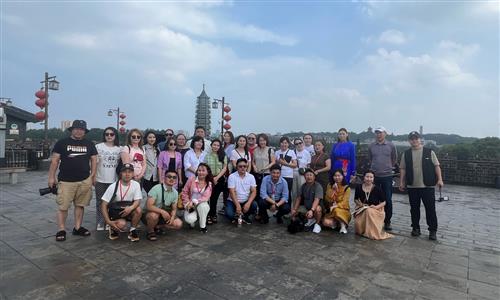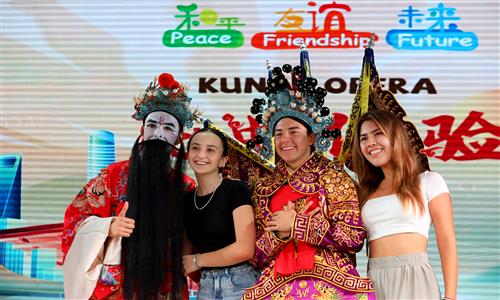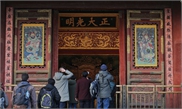ARTS / CULTURE & LEISURE
Classic music integrates with Chinese fine traditional culture, telling China’s story and connecting world
Classic music integrates with traditional culture, telling China’s story
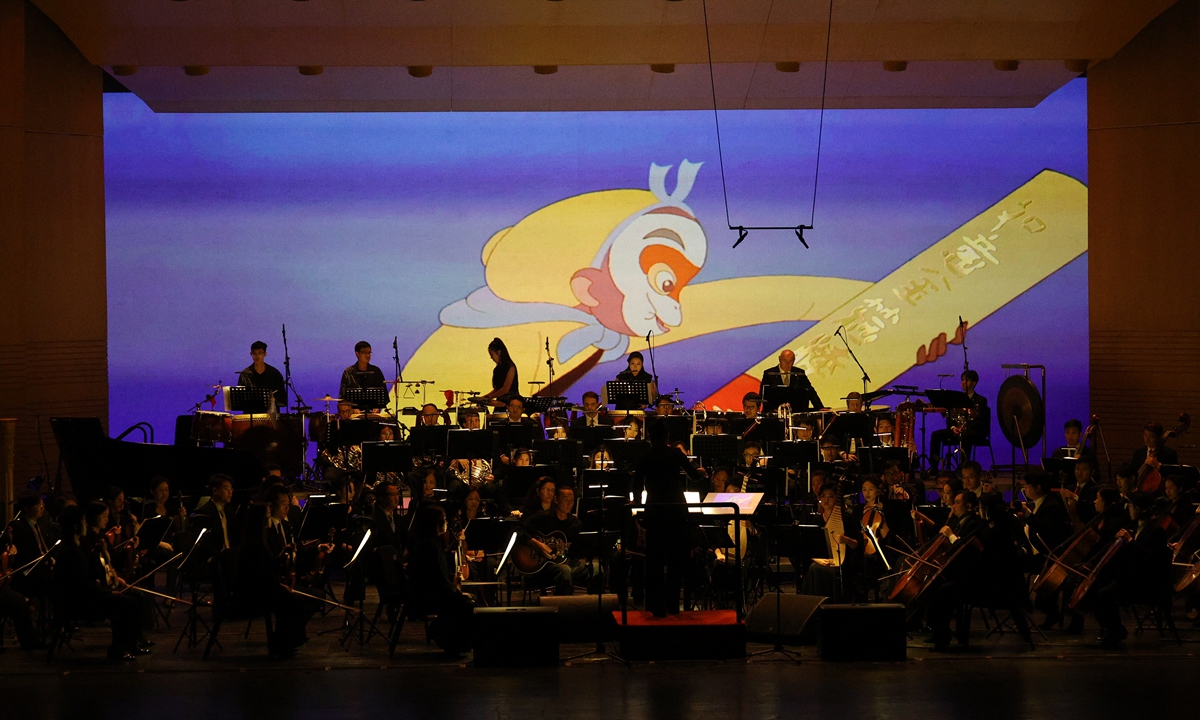
Members of the Shanghai Symphony Orchestra perform the music pieces from The Monkey King. Photo: Courtesy of Beijing Music Festival
Instruments that would not generally be used in Shanghai Symphony Orchestra, such as pipa (a pear-shaped stringed instrument) and electric guitar, are included where appropriate. Even Peking Opera beats are extensively used, as seen in the original animation. Pipa and guitar are introduced to highlight the fight when the Monkey King goes to get his golden-banded staff and fights the fish and shrimp soldiers of the Dragon King of the East Sea.
As a century-old orchestra, "Our goal has always been to be an active orchestra. It must have something of the times and catch on with the pulse of the times," Zhou Ping, head of Shanghai Symphony Orchestra, told the Global Times in an exclusive interview.
Although symphony originated in the West, "traditional Chinese culture has numerous heritages and a huge treasure trove of inspiration, which can continue to inspire our creativity and produce more integrated music pieces."
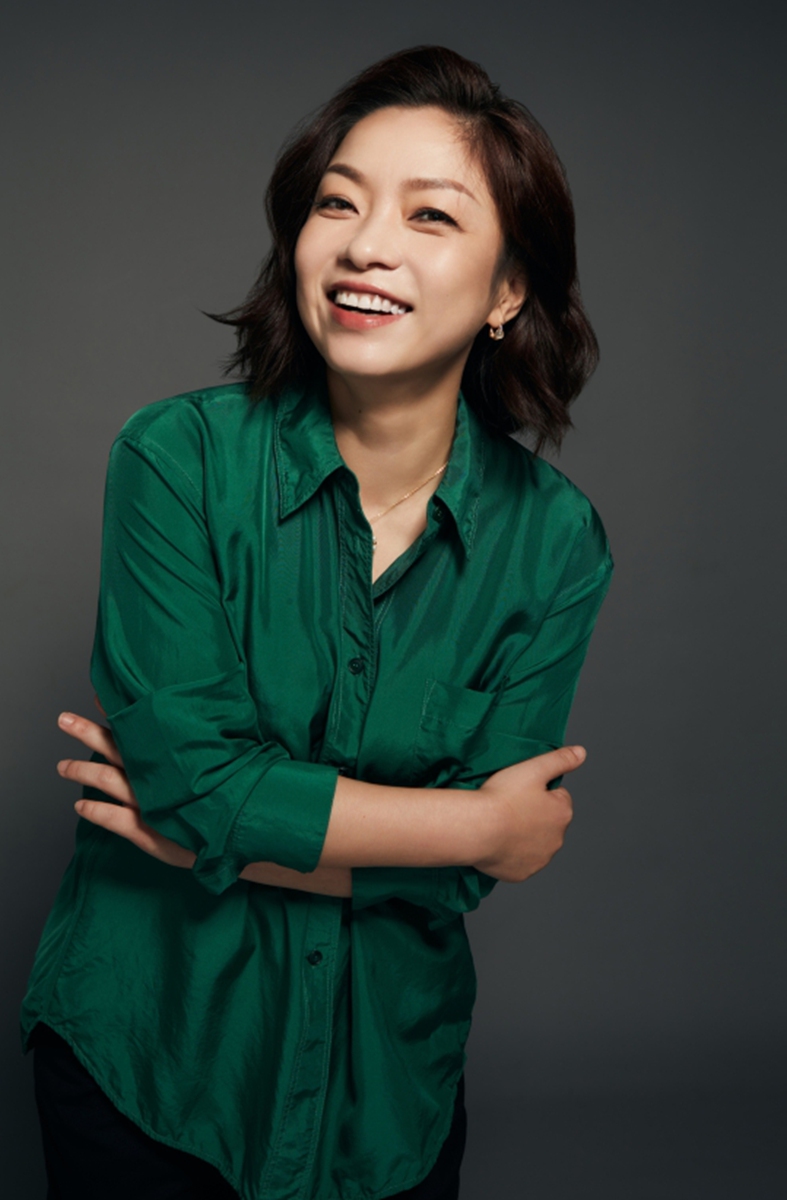
Zhou Ping, head of Shanghai Symphony Orchestra Photo: Courtesy of Shanghai Symphony Orchestra
Commissioned inspirationThe Monkey King encapsulates century-old Chinese animation and the main character Monkey King is one of China's most well-known cultural icons, which makes the joint commission piece between Shanghai Symphony Orchestra and Shanghai Animation Film Studio "very interesting, inspirational and meaningful."
"We retained the style of the original version at that time and combined it with many musical elements of traditional Chinese operas. While Chinese percussion played throughout the chapters, we also integrated pipa, piano and other instruments into the symphony orchestra's performance, and added modern jazz-style creations," said Zhou before the performance at the Poly Theater on October 5. Together with the screening of the film, the Monkey King, or Sun Wukong, has been vividly presented.
At the stage of Beijing Music Festival, the orchestra also presented a concert by Shanghai Quartet and semi-staged production of composer Hao Weiya's AI's Variation, Opera of the Future.
Inspired by the collection owned by Shanghai Museum, their latest opera piece Ode to the Silk Road will raise the curtain of Shanghai Art Festival. It uses digital multimedia technology to break the traditional auditory boundaries and combine music, light and shadow, and architecture to build an immersive music scene that integrates audio and video.
"We pay much attention to jointly commissioned pieces with the belief that it can get more attention and chances to be staged with support and promotion from other organizations," she said.
Whether it is good or bad? Only when these performances were "widely delivered to an audience, can you have the answer."
Living in an internet age, we have numerous ways and platforms to showcase Chinese culture from videos, animations to movies and others.
"What we really need are works that can penetrate into everyone's cultural hearts, achieve cultural integration, easily be understood and recognized," said Zhou, whose orchestra is at the final stage for their coproduction with the New York Philharmonic.
Émigré, a 90-minute oratorio telling the story of Jewish refugees escaping Nazi Germany and finding a safe haven in Shanghai, will debut on November 17 in Shanghai. It is written by award-winning composer Aaron Zigman, with lyrics by Pulitzer Prize-winning librettist Mark Campbell and songwriter Brock Walsh. It was co-commissioned by Chinese conductor Yu Long, the Shanghai Symphony Orchestra and the New York Philharmonic.
'A warm story'
"It is even more precious nowadays that musicians from China and US can work on such a warm story, the Jewish refugees living in Shanghai during the World War II," she said. "It is a touching story about community with shared future."
However, it is not a story about saving or being saved, but a story that a city warms these people and they bring new things to Shanghai at that time.
In 1938, Jewish refugees fled Europe one after another, and Shanghai turned into "Noah's Ark" for some of them. More than 30,000 Jews fled to Shanghai to escape the Nazis after Kristallnacht (a pogrom against Jews throughout Nazi Germany on November 9-10, 1938), arriving shortly after China had recently suffered the atrocities of the Japanese occupation and the Nanjing Massacre. About 400 of them brought colorful music and various genres to Shanghai including jazz, pop, musical and operas.
"In the flood of history, we cannot avoid the changes in social circumstances and human destiny, but the light and goodness of humanity is a flat boat that never sinks," said Yu Long, the orchestra's artistic director and also a renowned conductor.
The cast for November premiere will feature Ben Bliss and Arnold Livingston Geis as the two Jewish brothers, with Shen Yang, Zhang Meigui, Andrew Dawn, Zhu Huiling and Diana Newman. The same cast will also perform in New York for the US premiere.

